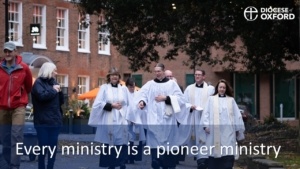A Presidential Address to the Oxford Diocesan Synod, September 2020
It’s very good to regather virtually after the summer and to begin what I guess will be a season of regathering in a thousand different places as we begin to rebuild together after the lockdown. There will be great joy in this but also great challenge.
We will be rebuilding and regathering as local church communities and schools and chaplaincies and all their associated ministries and this will take time. We will be playing our part in sustaining villages and towns and cities across our Diocese as disciples as well as hospitals and universities and businesses and civic life. Thank you for all you continue to give in so many ways to this process. I’m deeply appreciative of the many signs of grace I have seen in so many different ways over the last six months. I thank God for you.
We are all aware that we begin this work of rebuilding in a season when we are still learning to live with COVID 19. In the coming months we will be dealing with the aftermath of the first wave of the pandemic: bereavement and ongoing sickness for many; emotional and mental illness for others; the economic effects of lockdown; difficulties in families; the effects on the education and well being of children and young people; and the disproportionate effects on some parts of our communities.
But we begin to regather also knowing that the storm is not yet over. There could well be still further serious disruption to the pattern of our lives, the risks of infection continue, especially for those who have been shielding, normal life cannot be restored in so many ways – and we do not yet know or see clearly whether this phase of living with the virus will last for six months or a year or even longer.
How then should we minister and serve our communities and God’s world in this next season, in a world in continuing crisis? How can we play our part as disciples and as citizens and play that part together as part of the Church of Jesus Christ?
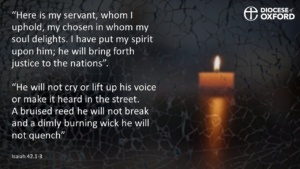 We all have wisdom to bring to this process and we will need insight from one other. But my starting point for responding to that question is to draw inspiration and our pattern from the humility and gentleness of Christ. I think these are the qualities we will need as disciples and as the Church in this season.
We all have wisdom to bring to this process and we will need insight from one other. But my starting point for responding to that question is to draw inspiration and our pattern from the humility and gentleness of Christ. I think these are the qualities we will need as disciples and as the Church in this season.
I am drawn especially to two biblical passages on these themes. The first is the tender description of the servant of God in Isaiah 42. The servant is called to minister to God’s people in a time of great crisis yet also great hope for the future. Isaiah 42 describes the kind of leadership which is needed in such a time of jeopardy and danger.
“Here is my servant, whom I uphold, my chosen in whom my soul delights.
I have put my spirit upon him; he will bring forth justice to the nations”. (42.1-2)
But how will the servant do this?
“He will not cry or lift up his voice or make it heard in the street.
A bruised reed he will not break and a dimly burning wick he will not quench” (42.3)
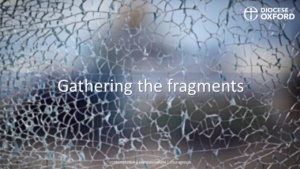 This is the kind of leadership which draws alongside people, which gathers the fragments, which liberates the gifts of others, which does not overwhelm, which listens and waits patiently to see what is emerging. This is the leadership we will need to exercise in the coming months as Christian disciples and as the church: the leadership of gentleness and tenderness and patience.
This is the kind of leadership which draws alongside people, which gathers the fragments, which liberates the gifts of others, which does not overwhelm, which listens and waits patiently to see what is emerging. This is the leadership we will need to exercise in the coming months as Christian disciples and as the church: the leadership of gentleness and tenderness and patience.
The second passage is the one I hope we will read together as we dwell in the Word in this coming year from Philippians 1 and 2. Paul describes the heart of the way in which Almighty God ministers in coming to a world in chaos and crisis and hurt.
“…he emptied himself, taking the form of a slave, being born in human likeness. And being found in human form, he humbled himself and became obedient to the point of death, even death on a cross” (Philippians 2.6-8)
The humility of Christ will be needed as we seek to rebuild together: the humility which is not only at the heart of the character of Christ but the humility which is at the heart of the pattern of the incarnation, of the substance of Almighty God taking flesh in Christ, of Christ by his Spirit creating the Church as his own Body, to continue his life-giving work in the world, a gentle, tender community of grace.
Humility will be key as we offer to support local communities and build up our neighbourhoods; as we draw alongside those in debt or financial difficulty; as we seek to support families in stress; as we reach out to the isolated and bereaved; as we share the purpose and the hope that we have found in Jesus Christ.
We do not offer what we offer of ourselves: we offer what is ours because of God’s grace to us. We do not offer what we offer from a sense of superiority or to create dependence. We are aware and conscious of our individual and corporate failings, how often we ourselves fall short. We know that as a church we stand in need of deep spiritual renewal. We will begin to find that renewal, I hope and pray, as we continue to centre ourselves on Jesus Christ, on his character, on the pattern of the incarnation and on serving the needs of the communities around us with the gentleness and tenderness of the servant.
The humility of Christ is not self-negation and the erosion of individual gifts, character or personality. Christian humility is the path to becoming our authentic selves, offering our whole lives to the purposes of God and the path of deep joy.
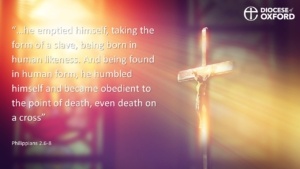 The humility of Christ is not surrender, withdrawal or submission as the world around us sees these qualities. Philippians 2 has sometimes been wrongly used to support a message from those who have power to those who have none, to suppress dissent and to resist change. This message in turn has supported the continued oppression of women or black people or the LGBTQI+ community. We can have no part in this either within the Church or in the engagement of the Church with the culture around us. Embracing the humility of Christ does not mean muzzling our prophetic voice or edge.
The humility of Christ is not surrender, withdrawal or submission as the world around us sees these qualities. Philippians 2 has sometimes been wrongly used to support a message from those who have power to those who have none, to suppress dissent and to resist change. This message in turn has supported the continued oppression of women or black people or the LGBTQI+ community. We can have no part in this either within the Church or in the engagement of the Church with the culture around us. Embracing the humility of Christ does not mean muzzling our prophetic voice or edge.
The humility of Christ is not weakness, finally, but strength, tenacity and determination to effect change for the sake of the kingdom of God, stepping into difficulties to seek to resolve them, not stepping away. But that strength, determination and power will need to be mediated through humility as we face the challenges ahead.
There will need to be a great deal of listening as we explore how best to re-open our churches for services of worship safely again and as we also continue with the online services which have sustained us during the lockdown. In many places this will take time. But I do want to offer encouragement to every benefice now to find ways to re-open for physical services of worship in the coming weeks and as we rebuild our sacramental life. I want to offer encouragement to every Christian disciple to reset their rule of life, giving priority to Sunday worship and to make their way back to Church physically as soon as it is safe and possible to do so.
We are flesh and blood and physical beings, not disembodied minds or spirits. God made us that way and God became a human person. That physical encounter is an essential part of our humanity. We may not yet be able to do everything we want to do when we gather as the Church on Sundays and on other occasions. We may need to regather in smaller numbers and in more restricted ways. But in those circumstances we should do what we can do safely to restore public and physical prayer and worship at the heart of every parish and community.
There will need to be a great deal of listening, especially, as we seek to rebuild our ministries with children and young people and families and offer support to our schools. As I have listened across the Diocese, this is probably the area among very many that has been hardest during lockdown. My own perspective will be that wherever possible it will be important to connect physically, to meet face to face, to begin community and young people’s groups and Sunday Clubs again, and to regather and reconnect families wherever it is safe to do so. Every school in every parish will need support and chaplaincy and care, not only our Church schools.
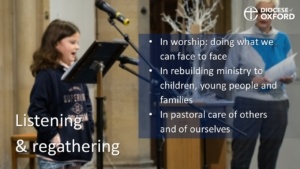 And there will need to be a great deal of listening to ourselves and to our own communities in a time when so many have been placed under stress and pressure. This is a season when all of us will need support and care. We will each need to watch over ourselves and one another and over the whole Church of God, with the same patience and tenderness and love which the servant of the Lord demonstrates in Isaiah.
And there will need to be a great deal of listening to ourselves and to our own communities in a time when so many have been placed under stress and pressure. This is a season when all of us will need support and care. We will each need to watch over ourselves and one another and over the whole Church of God, with the same patience and tenderness and love which the servant of the Lord demonstrates in Isaiah.
Those who have sustained the church over this period, lay and ordained, will still be very tired. Those who have traditionally been load-bearing walls in the Church may find that they begin to give way under accumulated pressures.
So this is a season to be alert as shepherds and pastors to those who are struggling, to the sheep who have wandered away or become distracted or tired, to the injured, to those who need particular care. That will include ourselves. We will need to be patient and gentle, to not break the bruised reed nor quench the dimly burning wick. We must not be in too much of a hurry.
Over the last few months as I have listened across the Diocese, I have found myself returning again and again, surprisingly actually, to the things I learned during the early years of Fresh Expressions. In forming new congregations for those who are outside the Church, the Church emerges and has to be thought through from first principles, in different contexts and places. The heart of pioneer ministry is tending this continuous reflection and development as the new community emerges by the grace of God in a different culture and context.
As the whole Church emerges into a new normal, in which so much is fluid and continuously changing, every ministry is now a pioneer ministry: leading, supporting and forming church in a new cultural context. This takes time and energy and hope. There are many setbacks along the way – but Christ is with us in the journey.
Thank you for your partnership and your prayers in this next part of our journey together. I look forward to learning much with you as together we discover what God is doing and join in as best as we are able.

Bishop of Oxford
Presidential address to Diocesan Synod
5 September 2020
Diocesan Synod took place as a Zoom meeting, this is the audio recording of +Steven’s address to Synod.


